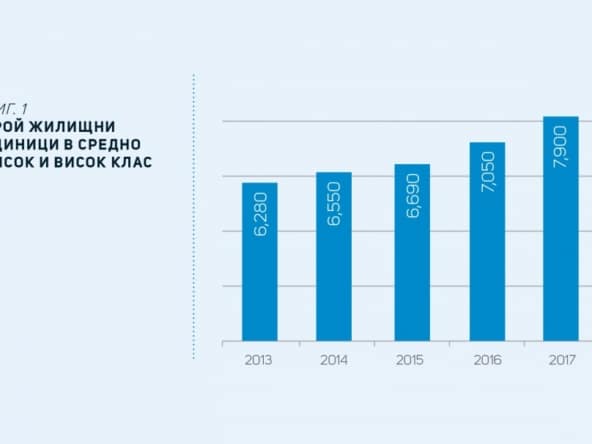The 5 most common mistakes when buying real estate.
We pay before we are pre-approved for a mortgage loan, or before we are aware of the terms of the loan
Many buyers make the mistake of looking for a home of their own before meeting with mortgage lenders (banks) and finding out in advance whether they will be approved for a future loan and how much they can be granted. In this way, we may end up with a property that we cannot afford or buying it would strain our personal budget to the point of causing huge inconvenience. It is not impossible to enter into a contract for a property and the bank's refusal to finance it, leads to the seller cancelling the contract and leaving you with an unpleasant situation where you lose the down payment and are left without a property.
Consequences: we buy a property we can't afford; we are put in default for payment and the seller cancels the contract and we are left with no property and no down payment.
Tip: Before you fall in love with that gorgeous property of your dreams, make sure you get pre-approval. Ask for prior written approval on the amount that can be lent to you before you pay a "down payment". Make sure you have the answers to the questions posed below. Before looking for a property, make sure you get good offers by taking care of your credit score.
The reasons for the error:
1. We trust verbal agreements with the bank, but things change later
Many buyers make the mistake of looking for and capping a property before they have received prior written approval for the maximum amount a banking institution can lend you as a mortgage. It is no lie to say that in most cases, bank officials mislead the buyer by assuring them that the loan will be approved at any cost, but the property should be found first, documents should be submitted, etc. In reality, in order to obtain a specific offer of credit for a property, we should provide the bank with specific information (type, price of the property, payment terms, etc.) which, in order for the offer to be as fair as possible, must be accurate. However, once you have shared certain information with the loan consultant or bank officer, they can set clear parameters as to how much they would lend you, in what amount and on what terms. Keep in mind that written approval is valid for a specific period of time. It is a written approval for the amount they can lend you, not for a specific transaction and a specific property. Don't think that if you spoke to your bank just six months ago and were given a verbal agreement that you would be granted a loan, that this is a certainty. Things change all the time. Ask for a written commitment from the bank and pay a fee for it if necessary.
The information you will need is: your income, how much you can invest with your own money for the purchase (deductible), the price range of the property you are looking for, how much you can spend on your monthly loan payment; what type of property you intend to buy (flat or house, warehouse, commercial premises), at what stage of construction (completed, greenfield - under construction), the type of instalments you wish to repay your loan with (annuity, i.e. equal or decreasing), whether you wish to use a grace period (pay smaller instalments over a certain period of time, but which only cover interest);
2. We don't care about getting better credit offers.
When the bank makes an offer, it considers your creditworthiness and credit history. Make sure you are not a "bad debtor" to the bank. This means considering the following important things:
Your credit history should be good - if you have taken out a loan years ago or were a co-borrower on such a loan (understand also "quick loan") and the same has not been repaid on time, which is why the bank has condemned you and has declared the loan to be prepayable, your data is stored in the so-called Central Credit Register at the BNB. This means that the bank will become aware of your bad credit history when checking your credit file and may refuse to grant you a loan or require more conditions to grant you a loan - for example, additional collateral from a co-borrower. The bank's terms may not be good - for example, by offering a higher interest rate; the bank also checks whether, when you take out loans or buy leases, you regularly repay your instalments;
You have a proven consistent regular and sufficient income through which you will be able to regularly repay your debt - the bank checks whether you regularly receive income from employment or from self-employment; one of the online calculators would be useful to get an idea of how much expensive property you can afford relative to your net income and the regular expenses you have each month; whatever your income is, it should not exceed a certain percentage relative to all your credit obligations; this is a ratio of An applicant's total credit obligations must not exceed 60-65% of their net income when applying for a mortgage:
Example:
Single family with net income: 1500 BGN
Current loans payable: 200 BGN
Debt / Income: 60%
Possible maximum instalment on a new loan: (1 500 * 60%) - 200 = 700 BGN.
***If you are expecting a pay rise or other income, apply for credit after the fact; if you have unstable or insufficient income, you may need to secure a debtor;
Your health and social security contributions are paid regularly - the presumption of banking institutions is that you, by paying your monthly obligations to the Treasury regularly, are a fiduciary debtor who can be responsible with your recurring obligations; contributions to the Treasury also testify that you are in fact in employment or self-employed; Financial institutions prefer to grant mortgage loans to those applicants who have been in their last place of employment for at least two years. They believe that people who have held a job for more than one year are much more likely to pay their ĸpeĸdits on time; the recent trend of banks is to only carry out a 6 month look-back, but it is not impossible to deepen their enquiries; in this respect, it is important to keep on top of your employment and social security rights with your employers - it is important; you are not indebted at the time of your loan application - as mentioned above the bank always examines your net income to expenditure ratio; if you are indebted to a number of individuals your chance of approval or good terms is drastically reduced; substantial purchases are ineligible if you have decided to buy a property. This includes car purchases, taking out consumer short-term loans, having several credit cards issued in your name, etc. This significantly lowers your credit score and ability to rely on a mortgage unless you earn an extremely high income;
3. We only require a quote from one bank for cost savings and high credibility
Don't make the mistake of relying on the "word" of a bank. Meet with at least 3 lending institutions and ask for quotes from them. Many prospective buyers use the service of credit counselors, which in most cases is free. Asking for more offers gives you the opportunity to gain a complete insight towards the banks' lending policies, and a chance to choose the offer that is most beneficial for you. Additionally, you get a fallback option in case a bank "reneges" on a promise to grant the loan you verbally promised.
Ask for complete information on loan application fees, interest rates, disbursement method, documents, etc. Banks usually differ markedly in their fee setting policies and in order to be competitive in the market, they often exempt individuals from costs.
It is important to know that fees are generally one-off and recurring; One-off fees are the fee for reviewing documents, for assessing your credit history, for a market valuation of a property, for a legal opinion, property insurance; Recurring fees are the fee for a package of products and services used by the bank, for servicing a current account and a mortgage loan account;
You should bear in mind that the lowest interest rate does NOT mean the best offer. So it is a good idea to compare the terms of at least 3 banks and rank them by interest rate, fees, insurance terms, service, testimonials, etc. You can use loan comparison portals to target specific banks in advance.
It is also very important that you request from the bank a draft of the loan agreement you are about to enter into so that you are familiar with its contents before the signing day. Seeing the loan agreement for the first time on the day it is signed is a sin.
4. We do not assess the important points in the credit proposal correctly
When we receive an offer from the bank that will finance the purchase of a property we should pay attention to:
- What is the maximum percentage of financing from the bank? - Usually the bank grants 85 % of the market valuation of the property purchased. You should bear in mind that it does not always correspond to the price you agreed with the seller and may be lower than that. The market valuation is prepared by a licensed valuer with whom the bank works. *Example: Market value of the property according to the appraiser: 100 000 BGN. * 85% max. % of financing = 85 000 BGN maximum loan amount, i.e. you must provide 15 000 BGN. Self contribution to the sale price. However, if your agreement with the seller is to pay 150 000 BGN and your valuation is lower - 100 000 BGN, you should provide a self-contribution of 65 000 BGN. There are banks that can also finance 90 % of the property, however this carries certain risks.
- How and on what terms does the bank disburse the funds - the question is extremely important, as it depends on what you should negotiate with the seller; *Example: the bank's condition is to disburse the loan in tranches, several stages, and the seller requires the amount in full; the bank requires to pay the amounts directly to the seller by bank transfer, while the seller insists on partial payment in cash;
- What is the interest rate on the loan and the APR? - do not confuse the interest rate with being your final cost of the loan; often there are additional costs and fees on the loan that you have to pay monthly - for example insurance, loan account settlement fee, current account, etc.; the APR is a much more correct indicator because it shows the total cost of the loan expressed as an annual percentage of the loan amount.
- Is it possible to get a discount on the interest rate if certain criteria are met? - these are usually the use of bank products - real estate insurance, credit cards, bank account, etc;
- What is the maximum term for which you can be granted a mortgage loan?
Generally, the longer the loan, the more interest you pay; however, as the term of the loan decreases, the monthly payments increase; be prudent in deciding on the term of the loan; better a longer term than overburdening you with high monthly fees; moreover, you can always pay off the balance early without paying penalty interest; the borrower has the right to partially or fully repay the loan principal early. In this case, he pays a commission of 1% (one percent) on the amount repaid early if the repayment is made before 12 months have elapsed since the loan was drawn down. The borrower shall not be liable for any early repayment commission if the repayment is made after 12 monthly repayments have been made since the drawdown.
- What is your monthly payment with all costs included - loan fees and insurance?
The bank should provide you with a draft of your repayment plan;
- What type of monthly repayments will we make - annuity (equal) or declining?
Decreasing installments are less preferred on the Bulgarian market as the reason for this is the requirement for higher income of the borrower. In the case of the annuity payment, the amount of the instalments is the same for the whole period of the loan. When starting the repayment plan with the instalments we pay more interest than principal. The interest payable decreases as the loan term approaches. With declining installment payments, monthly payments in the beginning months of the loan are significantly higher than toward the end and this could cause repayment difficulties. However, the amount of the instalments decreases over time and the interest paid to the bank is lower, since the principle of this type of payment with decreasing instalments is to pay interest only on the actual remaining debt month by month, whereas with equal instalments the interest is paid over the entire period of the loan.
- What are all the fees associated with the loan?
At certain times, banks publish offers to lend at no extra charge; standard fees payable are for property insurance, market valuation, credit approval, drawdown; some banks remove these fees but usually this is at the expense of a higher interest rate; the best way to become familiar with all the costs and compare offers is to read the pre-contract information form you will receive from each bank;
- What are the necessary documents you need to submit?
These can be a certificate of income from the employer, statements from the NRA for taxes and social security, marital status, etc.; documents concerning the property itself are also required; we have discussed in detail the issue of required documents for real estate transactions in the article Required documents for real estate transactions - types and procedures for their issuance.
- How long will the approval process take?
Assuming that you have received a pre-approval from the bank for the amount of loan they would grant you and you can now start looking for a property against the budget you have already set; it is proper to check how long the approval process takes for the loan to be granted for the purchase of the property you have already found. This is important so that you are fully aware when negotiating with the seller of your chosen property. It is not right to pay a down payment or enter into a pre-agreement with the seller, provided that the seller owes you to pay him 80 % of the sale price in full within 7 days of paying the down payment / signing the pre-agreement, and the bank has informed you that a 15-day period is required for approval. Missing this stage (pre-information) may put you in a position where you are unable to fulfil your written agreements with the seller, whereby the seller may cancel the contract and retain the deposit.
- Does the type of collateral - brick/panel, farmhouse, vacation property or parcel of land - matter in determining the financing percentage?
Keep in mind that if you are buying a built property (already in use) the market valuation of the same will be lower, therefore the value of the loan granted by the bank will be reduced; in addition, it should be noted that banks finance panel construction and brick construction differently;






